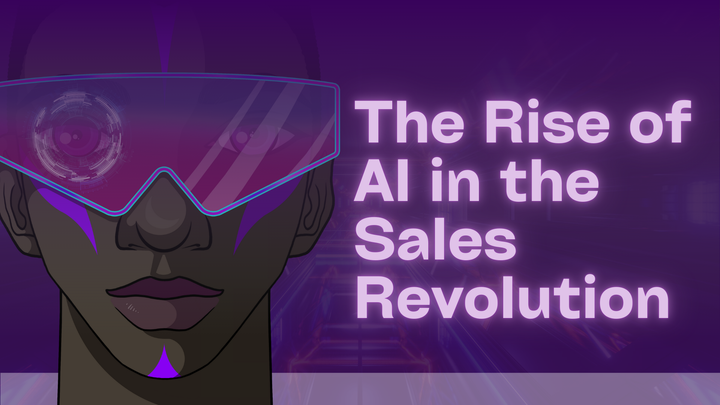How Is Artificial Intelligence Reshaping the Sales World?

Over the years, we’ve adopted various new technologies to improve efficiency and give businesses a competitive edge. Today, Artificial Intelligence (AI) is leading the way in industry transformation, and sales departments are no exception. A 2023 study conducted by McKinsey highlights that companies leveraging AI have experienced revenue growth ranging from 3% to 15%, alongside sales ROI improvements between 10% and 20%. This impressive surge underscores AI’s ability to revolutionize sales across the globe.
In this article, we’ll explore the surge of AI in the sales world, its key applications, and how it’s the next greatest tool for salespeople.
The Rise of AI in Business Sales
Artificial intelligence has gone far beyond our expectations. Now, they can function as a relentless assistant for sales departments and can effortlessly increase success rates. Research by Accenture shows that organizations adopting AI in their sales workflows can see lead conversion rates improve by as much as 30%.
By recognizing its high potential, organizations worldwide are integrating AI into their sales frameworks. Thus, AI is firmly established as a key player in the sales sector and is poised to grow and evolve even further with each passing day.
Applications Of Artificial Intelligence In Sales
1. AI-Driven Lead Generation and Data Enrichment
AI-powered lead generation streamlines the process of identifying potential customers by gathering leads from a wide range of platforms. When integrated with data enrichment, it enhances these leads with critical demographic and behavioral insights, empowering sales teams to prioritize and customize their outreach efforts for improved conversion rates.
2. Client Segmentation
AI utilizes large datasets to segment clients based on their business preferences, allowing organizations to develop targeted marketing campaigns and optimize resource allocation. This strategic approach ensures continued relevance and significantly improves conversion rates by connecting with the right audience through personalized messaging.
3. Intent-Based Lead Targeting
AI utilizes sophisticated algorithms for intent-based lead targeting, enabling the identification of potential buyers through their online behaviors and interactions. By analyzing data from diverse sources—including website visits, content engagement, and social media activity—this approach empowers sales teams to prioritize leads that demonstrate strong purchasing intent.
4. Automated Customer Engagement
By strategically using customer data and behavioral insights, automated customer engagement allows businesses to provide personalized messages, recommendations, and support, thereby significantly improving the customer experience. Tools like chatbots and email marketing automation ensure timely interactions, nurturing stronger relationships and ultimately enhancing customer satisfaction.
5. Sales Pipeline Management
By systematically analyzing data at each stage of the sales pipeline, AI tools yield critical insights into lead behavior, anticipate sales outcomes, and highlight potential bottlenecks. This allows sales teams to strategically focus on high-value leads and base their decisions on data-driven insights. Furthermore, automated reminders and follow-ups streamline operations, ensuring that no opportunities are inadvertently missed.
6. Personalized Content Recommendations
AI systems leverage data from past interactions, browsing habits, and purchasing trends to offer tailored recommendations for products, articles, or promotions. This customized strategy enhances the customer experience and significantly increases engagement and conversion rates, as prospects are more likely to engage with content that resonates with their specific interests and needs.
7. Automated Sales Reports
Automated sales reporting tools consolidate data from CRM systems and sales platforms to deliver insights into performance, trends, and team productivity. This enables sales managers to monitor key metrics easily, facilitating timely decision-making and strategic adjustments. Ultimately, this approach saves time and enhances accuracy, ensuring sales teams have the latest information to drive performance and meet their targets.
8. AI-Powered Error Detection
AI systems continuously analyze patterns and anomalies in real time to detect potential errors, including incorrect pricing, data entry inaccuracies, and discrepancies in sales reports, before they disrupt operations. This forward-thinking approach minimizes the risk of expensive errors, strengthens data accuracy, and boosts overall operational efficiency.
Will AI Replace Sales Professionals?
The World Economic Forum estimates that AI could eliminate 85 million jobs by 2025, raising the question of whether AI will replace sales professionals. However, AI lacks the emotional intelligence, creativity, and intuition vital to sales. It cannot replicate the human touch that builds trust and relationships with clients. Its effectiveness depends on data quality.
Furthermore, it’s important to consider ethics, as sales teams must manage data privacy and transparency to keep customer trust intact. Rather than treating AI as a competitor, sales professionals should adopt it as an asset that boosts their effectiveness and allows them to focus on priority activities.
Conclusion
The rise of AI in sales marks a game-changing shift, making it a vital part of the sales process. While human skills and insights are irreplaceable, leveraging AI can supercharge sales strategies. By adopting AI as a partner, businesses can enhance their sales performance and tackle market challenges with greater ease.
As we move forward, this powerful collaboration will empower sales teams to thrive and achieve remarkable success in an ever-evolving landscape. The next era of sales is here—let's lead the way!
